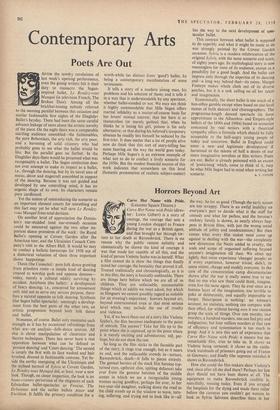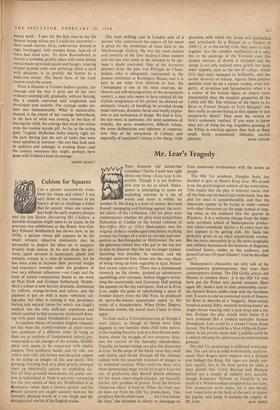Horrors Beyond Art
Carve Her Name with Pride. rt, (Leicester Square Theatre.) Carve Her Name with Pride (direc- tor: Lewis Gilbert) is a story of courage, the courage that sent a young London shopgirl to France during the war as a British agent, and that brought her through tor- ture to her death at Ravensbrilck. There is no reason why the public cannot suitably and cinematically be shown the kind of courage it was that made her capable of all this, and the kind of person Violette Szabo was in herself. What a film cannot do is show the things that finally tested her courage, the bestiality that proved it all. Treated realistically and chronologically, as it is in this film, the story is basically unfilmable. There are things here before which we are all of us children. They are unfaceable, unreasonable things which as'adults we must admit, but which as filmgoers we cannot possibly regard as suitable for an evening's enjoyment : horrors beyond art, beyond entertainment even at that most serious level which may include the use of cruelty and violence.
Yet, if we leave them out of a story like Violette Szabo's, the film becomes inadequate to the point of untruth. The answer? Take her life up to the point where she is captured, up to the point where it is merely exciting and adventurous; tell, per- haps, but do not show the rest.
So long as the film sticks to the faceable part of the story, it rings true enough; but as it nears its end, and the unfaceable crowds in—torture, Ravensbrtick, death—it falls to pieces entirely. The genteel heroics of the stock film heroine (up- turned eyes, upthrust chin, spitting defiance) take over from the genuine heroism of the middle scenes in which we see a recognisable young woman saying goodbye, perhaps for ever, to her two-year-old daughter, walking down the road as the child stands up at the window to wave, turn- ing, suffering, and trying not to look like it—all the way. So far so good. (Though the early scenes are too scrappy. There is an awful inability on everyone's part to decide what is the stuff for comedy and what for pathos, and the heroine's cockney family is shown, as nearly always hap- pens in British films, with just the wrong social attitude of jollity and condescension.) But then comes what every film maker must come up against in dealing with the war—the completely new dimension the Nazis added to cruelty, the scale and scope of organised suffering beyond anyone's imagination till then. We often say lightly that some experience 'changes' people; as if every experience, however trivial, didn't, to some extent, change and modify everyone. In the case of the concentration camp documentaries shown after the war it really seems true to say that no one who saw them could think, imagine, even live the same again. They lie ever since as a bottom layer of the imagination, -too terrible to poke at deliberately, and equally impossible to forget. Description is nothing : no witness's account, no statistics, nothing can compare with their effect, for without having seen it one cannot grasp the scale of things. Over one murder, two murders, a hundred murders, one can feel pity and indignation; but four million murders at that rate of efficiency and systemisation is too much to grasp. And it is into this sort of experience that Carve Her Name with Pride, a sincere but un- remarkable film, tries to take us. It shows us Violette being tortured; it shows us the cattle- truck trainloads of prisoners going out of France to Germany; and finally (the supreme mistake) it shows us Ravensbrilck.
How else could the film makers show Violette's end, since after all she died there? Perhaps her last days should not have been shown at all. The equipment to make Ravensbrtick credible is, mercifully, missing today. Even if you scraped the hospitals for the dying and made them totter before the cameras you couldn't get women to look as Sylvia Salvesen describes them in her
recent book : 'I saw for the first time in my life human beings whose sex I could not determine— their heads shaved, dirty, cadaverous, dressed in rags, barelegged, with wooden shoes. And all of them had dead eyes.' To show Ravensbriick as merely a crowded, grubby place with some plump extras made up to look gaunt and hungry, wearing striped pyjama coats and pottering about a yard with pickaxes, is to prettify the horror to a ludicrous extent. The literal facts of the truth cannot reach the screen.
What is filmable is Violette Szabo's quality, her courage and the way it grew out of her very ordinary-seeming self, gradually, without forcing, like a muscle exercised and toughened and developed over months. Her courage under tor- ture was immeasurable. What is measurable, instead, is the extent of her courage beforehand, in the face of what was coming, in the face of leaving her child, the courage that made her refuse even the routine suicide pill. As far as the acting goes, Virginia McKenna looks exactly right for the part, having just the sort of looks that were most admired in wartime—the sort that look neat in uniform and unhappy in evening dress—and the tomboy sweetness that might, perhaps, have gone with Violette's kind of courage.
ISABEL QUIGLY



































 Previous page
Previous page